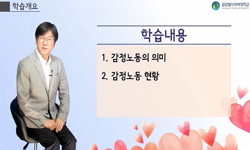Customers are ready to pay expensive that they want corporations involve deeply in employees` behavior of emotion expression to achieve customer satisfaction and to supply high quality service. Through it the present working environment and status of ...
http://chineseinput.net/에서 pinyin(병음)방식으로 중국어를 변환할 수 있습니다.
변환된 중국어를 복사하여 사용하시면 됩니다.
- 中文 을 입력하시려면 zhongwen을 입력하시고 space를누르시면됩니다.
- 北京 을 입력하시려면 beijing을 입력하시고 space를 누르시면 됩니다.
https://www.riss.kr/link?id=A102008991
- 저자
- 발행기관
- 학술지명
- 권호사항
-
발행연도
2015
-
작성언어
Korean
- 주제어
-
KDC
326
-
등재정보
KCI등재
-
자료형태
학술저널
-
수록면
35-46(12쪽)
- 제공처
-
0
상세조회 -
0
다운로드
부가정보
다국어 초록 (Multilingual Abstract)
Customers are ready to pay expensive that they want corporations involve deeply in employees` behavior of emotion expression to achieve customer satisfaction and to supply high quality service. Through it the present working environment and status of hotel`s emotional laborers can be understood, so high quality services can be supplied to customers, and basic data can be given for the practical and academic establishment of policies, and assistance can be given to improve and enhance the working environment of emotional laborers. All hypotheses for a structural model of the target to the structural equation modeling analysis was performed. The analysis revealed the following findings: Positive emotional expression request has significant positive (+) effect on surface acting and deep acting of emotional labor, making us adopt hypothesis 1 and 2. Though surface acting of emotional labor has significant positive (+) effect on Emotional dissonance, but not significantly deep acting, making us adopt hypothesis 3, and reject hypothesis 4, Emotional dissonance has significant positive (+) effect on Turnover Intention, leading us to adopt hypothesis 5. Consequently, if the hotel management demands high positive emotional expression to its employees, employees are conscious of high emotional labor, causing them to have emotional dissonance, turnover intention. Based on such hypothesis testing, this study gives practical hints for hotel business and provides basic data to devise policies to reduce emotional dissonance and turnover intention.
동일학술지(권/호) 다른 논문
-
- 한국관광연구학회
- 하보름(Bo Reum Ha)
- 2015
- KCI등재
-
항공사 제휴 마일리지 프로그램의 지각된 가치와 항공사 로열티, 제휴사 로열티 간의 영향 연구
- 한국관광연구학회
- 서정아(Jeong Ah Seo)
- 2015
- KCI등재
-
PPL 속성이 PPL 태도와 브랜드 이미지에 미치는 영향
- 한국관광연구학회
- 이은용(Eun Yong Lee)
- 2015
- KCI등재
-
호텔 기업의 경력개발지원이 구성원들의 혁신행동에 미치는 영향
- 한국관광연구학회
- 전현민(Hyun Min Chun)
- 2015
- KCI등재





 DBpia
DBpia


